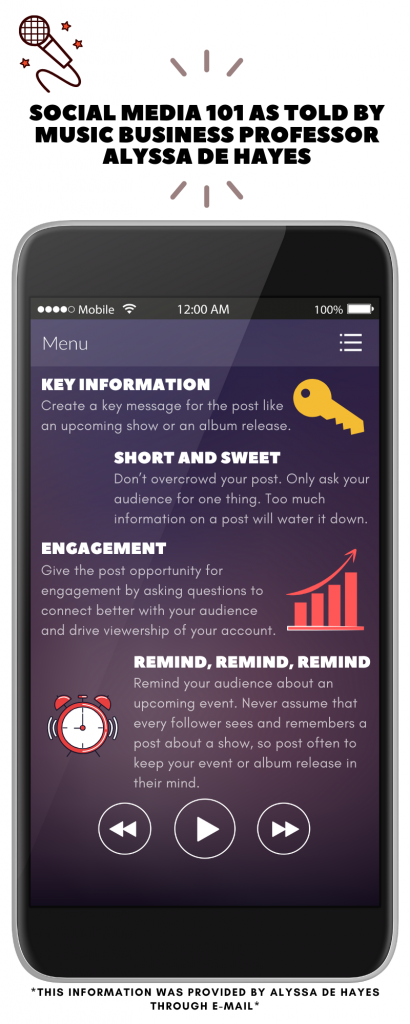Throughout the 20th century, musical artists have created promotion techniques to give themselves the best chance to become successful in the industry. Before the internet, a lot of this promotion was analog, meaning promotion through posters and word-of-mouth.
Drew Beskin, the current general manager of the Georgia Theatre, can recall wandering the streets of Atlanta, putting up posters to promote his band’s show, and feeling a bit like what he was doing was a lost cause.
“I remember walking around east Atlanta, hanging up these posters and thinking ‘if you’ve never heard the band, what’s a poster going to do?” Beskin said. “What type of person would see a poster and think oh, that’s a band name and that’s a cool looking poster; I guess I’m just going to go there!’”
Why It’s Newsworthy: Athens has been hailed for its thriving music scene for years, but only a few token local artists have hit the big success experienced by the likes of R.E.M. and the B-52’s. With social media becoming more of fixture in promotion techniques, musicians are faced with the conundrum of the best methods to rise from local fame.
Where musicians like Beskin once had to pound pavement and hang posters to let people know they were playing, those forms of communication have been streamlined into e-blasts and social
 media posts that are just a screen tap away. The introduction of these technologies within the past 10 years has changed the landscape of promotion techniques for musicians. In local scenes like Athens, artists now have the tools to promote their shows and music releases, allowing for a larger commun
media posts that are just a screen tap away. The introduction of these technologies within the past 10 years has changed the landscape of promotion techniques for musicians. In local scenes like Athens, artists now have the tools to promote their shows and music releases, allowing for a larger commun
ity, whereas before, the music community of Athens was very small. Each group has different techniques and how they use them to get noticed, but a certain question still remains.
“How do you get known when you’re not known?” Beskin said.
Disclaimer though — he doesn’t actually know the answer, and neither do some other local artists.
Each artist finds their own way to promote themselves. With today’s technology, there are more opportunities to be visible with social media, allowing the artist to do what they feel is best for their image.
Suspense and Social Media
When it comes to promotion, social media can often be the knee-jerk, go-to. It’s a way to easily connect with those not immediately around and can help disseminate information far faster than putting up posters, like Beskin was doing a decade ago.
“Not everyone is walking downtown on a daily basis […] If people are going to be on their phone anyway, they might as well be seeing a poster for a show,” said Seth Martin, guitarist and social media manager of the Georgia Dish Boys.
Social media can also be a way to build suspense, which comes in handy when promoting the release of an album.
“If we have an album coming up, I’ll try to like, months before just kind of start hinting at it and kind of roll out what the artwork will look like, and if we have a single, kind of do all that at the same time,” Martin said.
This is the case for another local Athens band, AFTM. Band members John Cherry and Kelly Bouchillion share that same goal when it comes to album promotion—tease your followers by giving sneak peeks into the recording process.
“Like, ‘oh, we’re in the studio. We just finished studio. Oh, we’re mixing; oh, it’s finally mixed… Yeah, we got things in the works. Oh, what are we cooking up,’” said John Cherry, keyboardist for AFTM.
AFTM vs. The Bigg Chungus
AFTM is just one of many local music acts bolstered by the Music Business Program at the University of Georgia. The band is made up of five members—Forrest Whitlark, Will MacLane, Cam Corsino, Bouchillon and Cherry—some of whom have been playing together since high school. While Bouchillon and Cherry are not in the MBUS certificate program, the group has experienced the same modest success experienced by some of its predecessors, such as other student- run bands like Walden and the Family and Friends.
Some of the AFTM band members, such as Cherry and Kelly Bouchillon, have taken their talents over to a side music venture known as Bigg Chungus. Bigg Chungus is a creative dumping ground in which Cherry, Bounchillon and members from a few other bands can let loose from the meticulously constructed musician aesthetic they’ve curated for promotional purposes and experiment with different types of music.
“I was like ‘well, I want to play some jazz stuff and some funk and stuff.’ So we got [a] group together, and then we got a gig,” Cherry said.
The Instagram presence for Bigg Chungus reflects that spirit of experimentation. Where AFTM is carefully crafted captions and tastefully edited promotional videos, Bigg Chungus is semi-premeditated randomness. It’s seemingly pointless and the very antithesis of the AFTM brand.
“Bigg Chungus itself is a mentality,” said Cherry, who runs the Bigg Chungus social media account. “I get really bored in between classes, and I’ll make those videos. It’s basically just unplanned, like no shame.”
AFTM’s main Instagram account has 3,819 followers. The first two pictures on the account have 289 and 276 likes respectively. The Bigg Chungus Instagram has 298 followers, with the first two videos garnering 190 and 211 views respectively, with their third photo coming in at 65 likes.
Social media presence does not guarantee admiration from all fans. Trey Love, a senior at UGA, follows both AFTM and Bigg Chungus on Instagram.
“AFTM has some super talented musicians, but I don’t really like their style and lyrics all that much…I don’t get the same musical sensation from them as I do Bigg Chungus,” Love said in an Instagram DM. “Chungus is an improv-based jam band that is experimental with their music and has a very funky, unique sound. Their shows are electric and make me move my feet.”
A band’s social media may be popular and successful but that does not guarantee that people are actually interacting with and enjoying the music.
“You’ll find bands that are great on social media and have 5,000 followers, but the music’s not that great or they can’t bring people to the show. Or bands that bring people to the show, and their social media’s nothing. So you can’t just go based on that,” said Beskin.
Alternative Routes
Social media isn’t the only “new wave” of promotion techniques. E-mail newsletters have assumed the more modern role of a newspaper ad or poster hung on the community bulletin board.
“We can go back through our ticketing, we can just email everyone who bought a ticket for this show and ‘hey if you like these five bands that came here, you’re probably going to like this band.’ We can even target that too, there’s a lot of geo-targeting,” Beskin said.
With the advent of Spotify and other music-streaming services, which Beskin considers a social media “in terms of getting your stuff out there,” bands also have the opportunity to reach more potential fans outside of a show setting.
“[It’s] easy access for people to hear music immediately,” Beskin said. “That’s where you can find new music.”
But even with all the apparatus of screens and phones to help increase connectivity, Cherry of AFTM still notes that “word of mouth is bigger than all of them.”
A Recipe for Success
Social media promotion isn’t the deciding factor to worldwide fame. It helps leverage, but Athens success stories like R.E.M. and the B-52’s were promoting themselves well before the advent of social media.
It seems that there’s a recipe for success that has to be measured out just right. One integral ingredient to that isn’t even the actual act of promotion. It’s the networking done by bands while touring or playing shows to build a fanbase and group of people within the industry that they can rely on.
“The venue putting up posters and doing social media are both essential. Also, the local band you play with in that town doing it as well is massive… [You’re] hoping that the venue and then those local bands that you’re playing with are doing their job because you’re going to do it for them when they come to your hometown,” Martin said.
While social media is a great tool to get a message out, it’s important to look past likes to see the tangible people behind the screen names. Ultimately those are people that will help lift a local act from relative anonymity to widespread success. And Beskin said that the best place to start is right at home.
“If your goal in making music is to become a household name in all cities, you’ve got to start somewhere. Having a hometown fan base is great,” Beskin said. “You’ve got to find the right people; you can’t do it alone.”
Megan Wahn, Sydney Ross, Will Broadwater and Olivia Turnage are seniors majoring in journalism in the Grady College of Journalism and Mass Communication at the University of Georgia.







Show Comments (0)